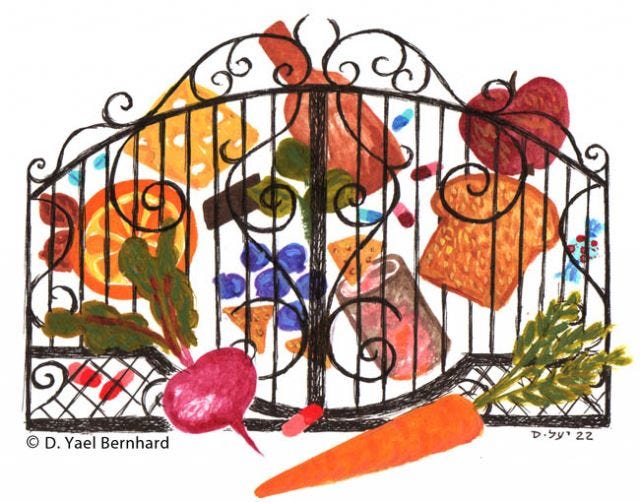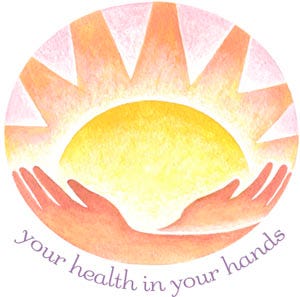Your Gut As Gatekeeper
Illustration © D. Yael Bernhard
Everyone knows the primary role of the digestive system: to break down food, deliver nutrients into the bloodstream, and eliminate waste. Yet even more fundamental than these essential tasks is the gut's role as gatekeeper. Through the gut, the outside world enters and dominates our bodies. The number of cells in the human body is estimated at 32 trillion1, while the number of microbes – bacteria, viruses, and fungi – in the average human microbiome is estimated at 39 to 100 trillion2. We are more "other" than ourselves.
Within a healthy gut, these microbes are beneficial and play important roles. Good gut bacteria maintain and restore the mucosal lining of the intestines. They keep bad bacteria at bay – provided they're well-fed with what is known as "prebiotic" fiber. This insoluble fiber is not digestible by us, but keeps our internal allies healthy and happy. Sources of prebiotic fiber include asparagus, dandelion greens, jicama, Jerusalem artichokes, raw garlic, pomegranates, and leeks. Beneficial bacteria also aid in the secretion of neurotransmitters such as tryptophan and serotonin, 80% of which are produced in the gut3. A healthy oral and gut microbiome has a positive effect on gene expression, and may make the difference between manifesting a negative genetic trait such as hypertension, cancer, or Alzheimer's disease – or not. The microbes within us also affect our sleep patterns, mood, and even the functioning of our brain through the enteric nervous system, located in the gut4 5. As one functional medicine physician put it, "the gut is the center of the universe when it comes to the immune system."6
As gatekeeper, the gut regulates what passes through our intestinal walls into our bloodstream. Back in my high school biology class, we were taught that microscopic food particles pass through the permeable cell walls of our intestinal villi. Today they're known to pass in between epithelial cells through openings called tight junctions7. These tiny spaces are governed by a mucosal barrier and protein components. As long as these protective mechanisms are in place, undigested and harmful substances do not pass into the bloodstream.
Illustrations of tight junctions show a structured pattern of what appear to be oddly-shaped tiles with wire latches (amino acids) in between. What these diagrams don't convey is that this is not a tiled wall, but a living, sensing organ, alive and responsive, more like a coral reef than a fixed structure. And like any living thing, it's sensitive and vulnerable. The mucosal lining of the gut protects this barrier, but if the beneficial bacteria that maintain this lining are wiped out by antibiotics or purged before a colonoscopy, the lining is compromised or may even disappear.
Perhaps the biggest insult to tight junctions is gluten, the protein molecule found in wheat, barley, rye, and some oats. Gluten is sticky (as its name suggests, coming from the Latin word for "glue"). It releases a substance called zonulin8 that weakens tight junctions and causes them to leak undigested food particles, endotoxins from bad bacteria, and gluten itself into the bloodstream – a condition known as "leaky gut." These substances are interpreted by the immune system as foreign invaders, and trigger an immune response. Gluten in particular closely resembles the proteins of the thyroid, so antibodies against gluten may also attack the thyroid – a major cause of Hashimoto's disease, which afflicts 1 out of 5 American women and 1 out of 10 men9. Leaky gut causes a wide variety of food sensitivities and autoimmune diseases, both of which have reached epidemic proportions in our society – including rheumatoid arthritis, cancer, multiple sclerosis, Crohn's disease, IBS, asthma, and more. Whether you're allergic to gluten or not, gluten antibodies in your bloodstream can damage and degrade your health.
This is why the bread in the above illustration is breaking through the gate – and why the trend toward gluten-free diets is not a baseless fad. Gluten-free diets are here to stay.
Carrageenan, a form of seaweed used as a thickener in certain products such as nut and grain beverages, may also act like gluten in the body. Carrageenan is controversial, and may be associated with inflammation of the colon and possibly even cancer10.
Many drugs as well as antibacterial mouthwashes and toothpastes, artificial sweeteners, and processed foods also damage the oral and gut microbiome, weakening tight junctions and contributing to leaky gut. In fact, having an unhealthy gut microbiome is increasingly understood to underlie almost all chronic diseases, which afflict over 50% of Americans, with up to 28% suffering from multiple chronic conditions11, at a staggering cost of over $4 trillion per year12.
Like a beautifully wrought iron gate, your gut is an intricate but delicate barrier that guards your interactions with the outside world and keeps your inner world harmonious. As in the image shown here, it has a lot of work to do managing multiple foods and substances. Is it worth giving up gluten and processed food to keep your gatekeeper healthy and strong? The choice is personal and individual. I crossed that threshold over a year ago, and never looked back.
We are walking ecosystems – microcosms of the environment in which we live. It's up to us to create a healthy gut microbiome with the foods we eat – and don't eat.
To your good health,
Yael Bernhard
Certified Integrative Health & Nutrition Coach
_______________
Yael Bernhard is a writer and illustrator with a lifelong passion for nutrition and herbal medicine. She was certified by Duke University as an Integrative Health Coach in 2021 and by Cornell University in Nutrition & Healthy Living in 2022. For information about private health coaching sessions or nutrition programs for schools, please respond directly to this newsletter, or email dyaelbernhard@protonmail.com.
Information in this newsletter is provided for educational purposes only.
_______________




